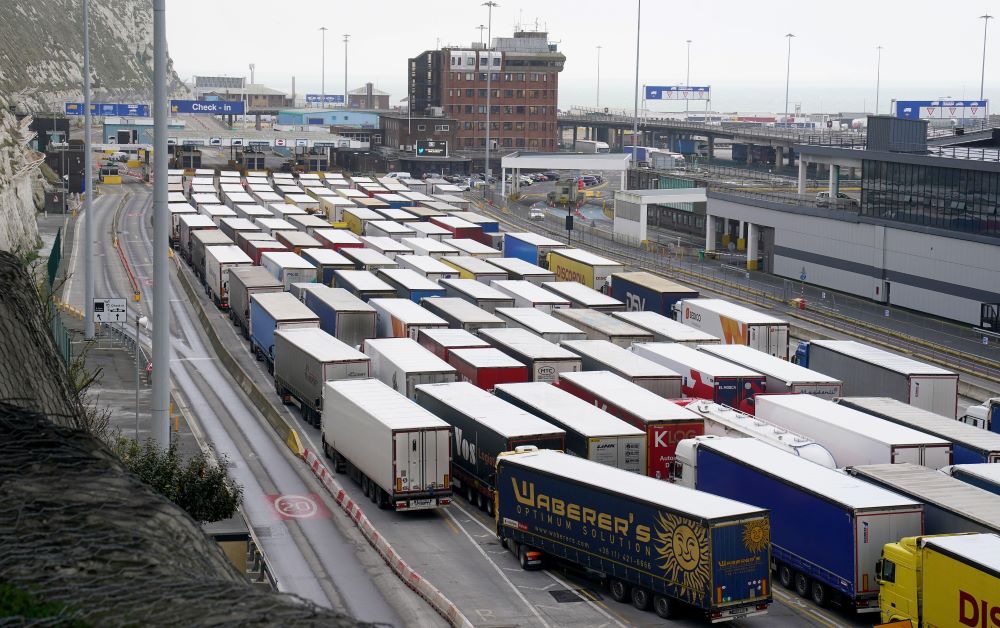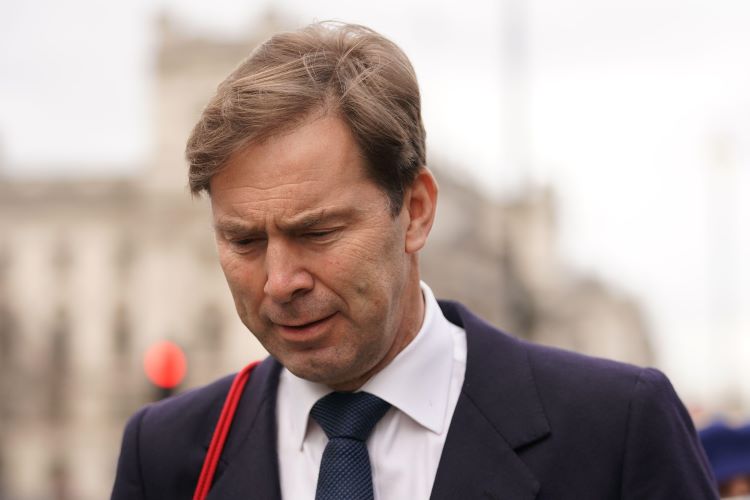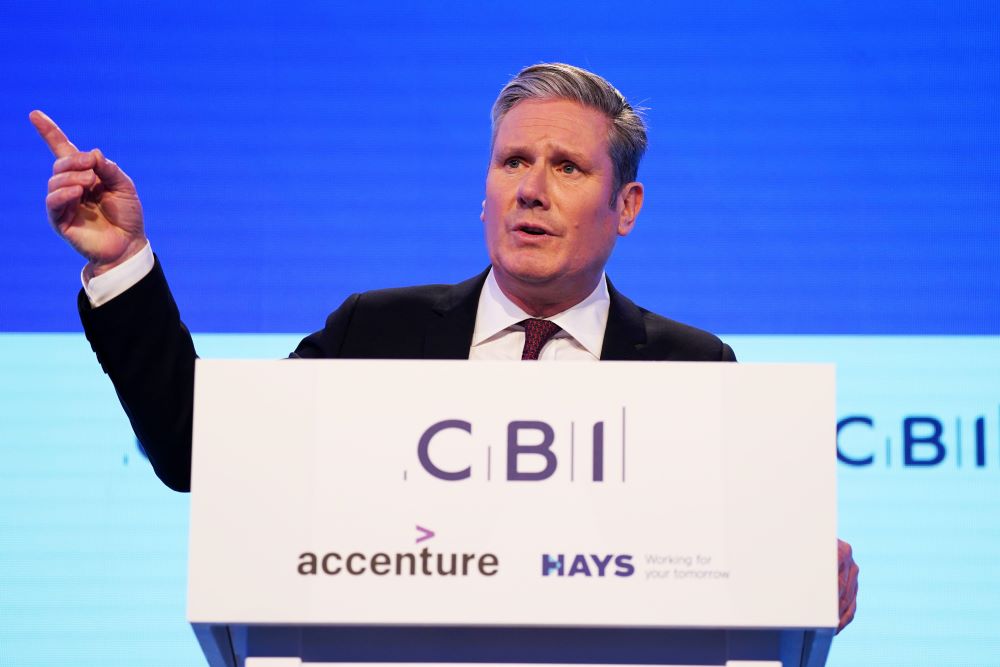UK Voters Want A "Closer" Post-Brexit Relationship With The EU In 2023
A Brexit protest outside the Houses of Parliament (Alamy)
7 min read
A broad range of the British public, including Leave voters, want the UK to have a closer relationship with the European Union going forward, according to exclusive new polling for PoliticsHome.
The poll by Savanta, which interviewed 2,065 adults between 16-18 December, found that 47 per cent of all respondents would favour a closer post-Brexit relationship with the EU, compared with 14 per cent who wanted to be further apart. Of people who voted to leave the bloc in 2016, 30 per cent said they wanted the relationship to be closer, while 18 per cent wanted to be further away.
The majority was broadly consistent across age ranges, with 51 per cent of 18-34 year-olds, 50 per cent of 35-54 year-olds and 42 per cent of over-55s all favouring a closer relationship with Brussels.
Nearly a third of people (29 per cent) surveyed believe Brexit is the primary reason for staff shortages in the UK, impacting a range of sectors like the National Health Service and agriculture.
Thirty four per cent of respondents said Brexit was party to blame for gaps in the labour market, while 25 per cent did not believe it was the reason for the issue.
There has been a growing discussion this year about the effects of Brexit and whether the UK's post-divorce relationship with the EU, negotiated by former prime minister Boris Johnson, ought to be adjusted to fit the tougher new economic climate.
“There is definitely a sense that the process has been bungled and that the benefits which Leavers were promised haven't really materialised," Savanta's political director Chris Hopkins told PoliticsHome.
"That leaves people scratching their heads somewhat.”
He added: “The fact that more Leavers told us they would like a closer relationship with the EU, than those who'd like a more distant relationship with the EU, is really interesting.
"While the idea is not necessarily proven, it does play into the murmurings of Brexit regret.
"Similarly, a third of Leavers (34 per cent) saying Brexit is a reason for labour shortages, and a third people overall telling us Brexit is the primary reason for it, is quite telling.”
The Brexit trade deal agreed by the Johnson government in December 2020, which prioritised national sovereignty over frictionless trade with the EU, resulted in a plethora of new checks on goods exported from the UK to buyers in Europe. Last month the Office for Budget Responsibility (OBR) said the new rules had resulted in a "significant adverse impact" on UK trade, "via reducing both overall trade volumes and the number of trading relationships between UK and EU firms".
While Brexit handed the government some new freedoms, like the ability to negotiate its own trade deals with countries around the world, there is a growing body of evidence showing the negative overall effect it has had on the UK economy, on top of the serious damage done by Russia's invasion of Ukraine.
Last week the Centre for European Reform's John Springford published new analysis estimating that the UK's departure from the EU was costing the country £40bn a year in lost tax revenue. Meanwhile, more than three quarters of UK businesses trading with Europe feel the post-Brexit arrangements are no help in terms of expanding their sales, while over half said they are still struggling with the new paperwork, according to research by the British Chamber of Commerce.

Sir John Curtice, a Professor of Politics at the University of Strathclyde and Senior Research Fellow at the National Centre for Social Research, said there had been a "gradual movement" towards wanting to be part of the EU in opinion polls conducted over the last 12 months.
“What is true is the polling pretty consistently suggests that there is a detectable majority in favour of joining the EU," he told PoliticsHome.
Curtice added that there had been drift towards "greater pessimism" over the effects of Brexit.
"Even if you take the view that the state of the economy is nothing to do with Brexit, which most analysts would not agree with, it’s very difficult to sell the idea that the policy has been economically successful when the economy is going down the tubes," he said.
"It’s a fundamental problem for the government and for the Leave side of the argument.”
Yet, while opinion about the UK relationship with the EU may be showing signs of shifting among the general public, in Westminster the debate has not moved a great deal since 2019, when Johnson pulled off a historic general election victory based on the promise to "get Brexit done".
Brexit remains an incredibly contentious subject within the Conservative party, both among its MPs and its heavily pro-Leave membership of around 100,000, as evidenced on two occasions in particular in 2022.
When in November The Sunday Times reported that senior government figures were looking at putting the UK on a path towards a Swiss-style relationship with the EU – i.e significantly closer trading ties – furious Tory backbenchers demanded that Prime Minister Rishi Sunak disavow the claim, and prompted hostile briefings to the media against Remain-voting Chancellor Jeremy Hunt.
There was a similarly incandescent reaction when senior Conservative MP Tobias Ellwood, who chairs the Defence Select Committee, wrote for The House in June that the government should help mitigate the cost of living crisis by rejoining the European single market.
Allies of Johnson, who at that time were trying to keep him in No 10, even briefed that the Ellwood article was evidence of a pro-EU coup to oust the prime minister who delivered Brexit. The following month, Ellwood lost the Tory whip, ostensibly for missing an important Commons vote while on a foreign affairs trip, and did not have it reinstated until Liz Truss's brief time in office.

Reflecting on his article and the backlash it triggered from Conservative colleagues, Ellwood told PoliticsHome there remained a "toxicity" in Westminster when it comes to the subject of Brexit, meaning "there is very little appetite, or dare I say courage, to go near it at the moment".
“Economically, we Conservatives made a poor decision regarding Liz Truss, but we ruthlessly corrected it," he said.
"That was done through the new budget. We’re revisiting the Integrated Review because our defence posture is under scrutiny following events in Ukraine. But when it comes to Brexit, nobody wants to go near this.”
The MP for Bournemouth East predicted that the public "will simply ask more and more questions about this model of Brexit" as its effects continue to become clearer.
"I stress there is absolutely no appetite for another referendum. But there must be ways that we can strike a better economic relationship with our largest trading partner.”
Brexit seems to be just as troublesome an issue for Labour, who have struggled to commit to a definitive position.

Party leader Keir Starmer, who held the Brexit brief in former leader Jeremy Corbyn's shadow cabinet, has previously supported holding a second referendum and campaigned for Remain in 2016.
But he has been very careful to avoid being seen as re-opening the Brexit question since becoming leader – often to the frustration of his most pro-European backers – and has instead pledged ambiguously to "make Brexit work". Deputy Labour leader Angela Rayner recently told the Financial Times that she “didn’t have a particularly strong view either way” on Brexit.
While Labour is committed to tweaking elements of the UK's post-Brexit relationship with the EU – like a veterinary agreement to help reduce trade barriers, and a new deal on mobility making it easier and cheaper for British performers to tour the continent – Starmer has shot down calls for a Swiss-style, close involvement in the European single market.
According to Curtice, Labour has more freedom to pursue a strategy of appealing to Leave voters who didn't support the party in 2019, particularly those in the North and the Midlands, because the Liberal Democrats now "don't want to touch" Brexit " having campaigned to reverse it in 2019.
"Labour doesn’t have enemies on the Remain side like it did at the 2019 election," said Curtice.
The pollster added that while public opinion on Brexit has clearly shifted, the free movement of EU citizens – which comes with membership of the single market – could still be a dangerous issue for Labour as it bids to win a general election for the first time since 2005, as the Conservatives will likely use any opportunity they can find to paint the opposition as pro-mass immigration.
“There is no doubt that free movement is the one bit of the Remain cause for which even among Remain voters there is relatively little enthusiasm," he said.
